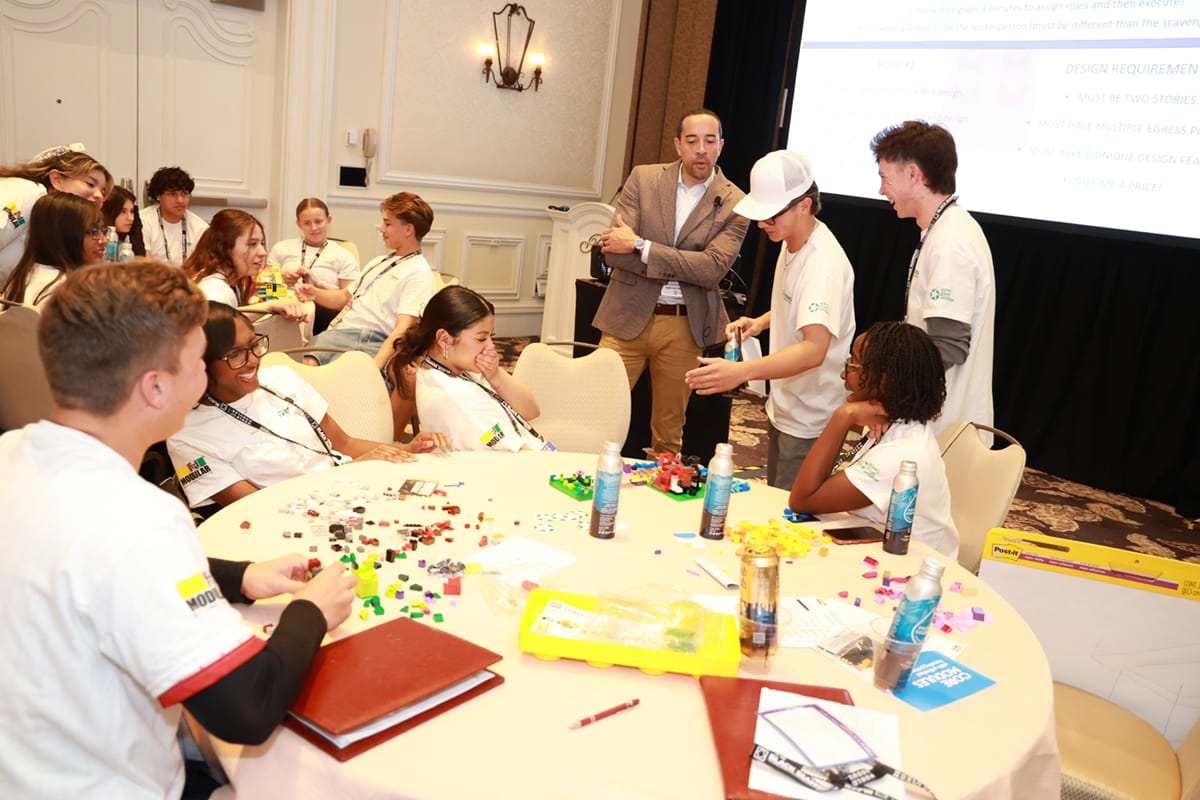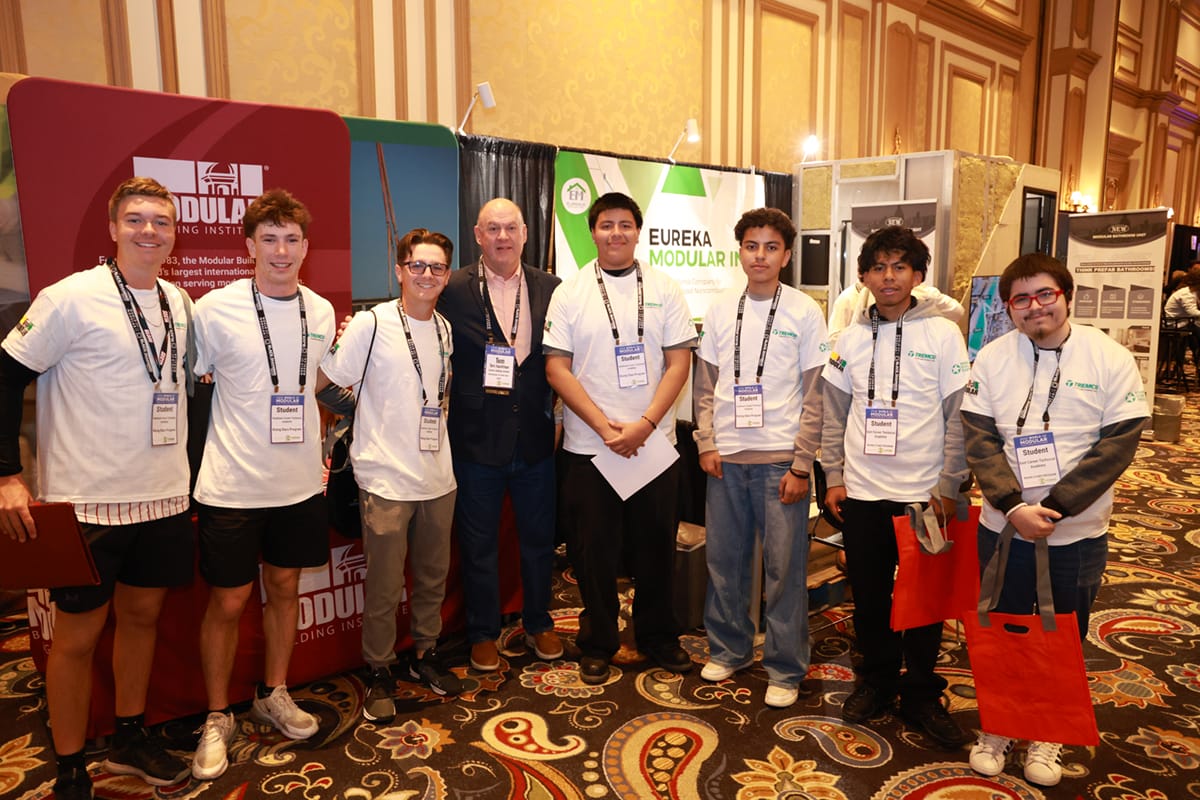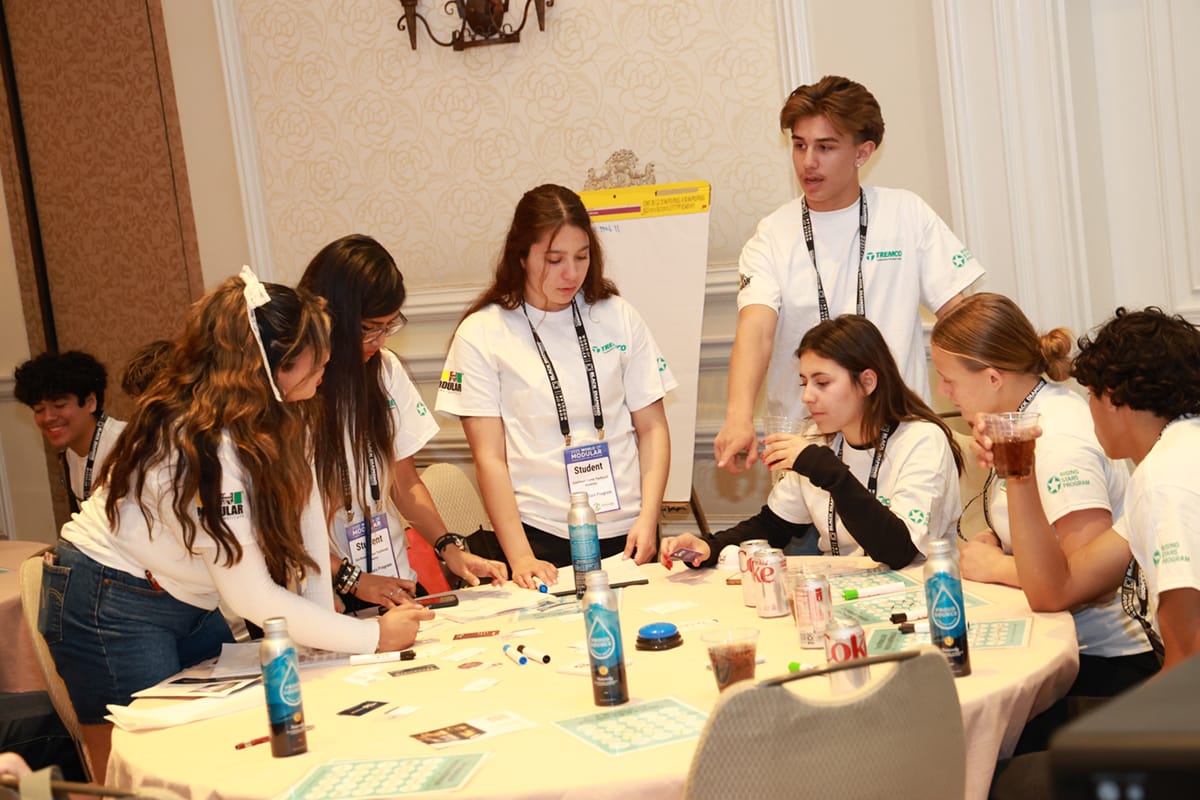Spotlight on the Future: MBI Hosts Tremco's Rising Stars at 2025 World of Modular
The Modular Building Institute (MBI) proudly welcomed 70 students from Tremco’s Rising Stars program to its 2025 World of Modular conference and tradeshow, continuing a growing tradition of connecting young talent with the modular construction industry. This partnership, which has been steadily evolving over the past few years, exemplifies MBI’s commitment to education, innovation, and the future of the built environment.
A Bridge Between Education and Industry
Held annually, the World of Modular is the modular construction industry’s most comprehensive event, attracting professionals, exhibitors, and thought leaders from across the globe. For the students, who this year hailed from East Career & Technical Academy and Southeast Career Technical Academy, the event offered a chance to interact directly with industry leaders from around the world.
Launched by Tremco Construction Products Group, the Rising Stars program introduces promising high school students to the building industry through immersive, hands-on experiences. The initiative aims to spark early interest in the trades and provide valuable exposure to real-world construction environments. MBI’s World of Modular offers the perfect stage for this mission, providing access to cutting-edge technologies, expert panels, and vibrant networking opportunities.
A Bridge Between Education and Industry
David Hutchinson, founder and executive director of the Rising Stars program, emphasized the importance of active participation during the event. “Once the students arrive the directive is to be curious and engaged,” he said. “We want them to break out of their shell and be inquisitive for the entire day. The takeaway should be two-fold. They will undoubtedly learn something they never have but also affirm their passions and how they may be applied in the future.”
To ensure this level of engagement, the Rising Stars’ day at the World of Modular is packed with high-energy activities tailored to encourage interaction, exploration, and creativity. “As it is such a compressed schedule we must move quickly through a lot of activities. The pace is what really makes it an exciting day,” Hutchinson explained.
The agenda begins with warm-up activities like a construction-themed jeopardy game and “construction bingo,” designed to break the ice and promote camaraderie. Students then dive into a scavenger hunt across the expansive tradeshow floor, a unique activity that not only enhances their understanding of the modular construction world but also facilitates conversations with industry professionals in a light-hearted setting.
“We finish the day with a LEGO® design build challenge,” Hutchinson said. “The goal of each activity is for them to learn about the industry in a very fun and interactive way.”

David Hutchinson (center) observes Rising Stars students during a LEGO® build challenge.

Tom Hardiman (center left), MBI's executive director, poses with students in the World of MOdular exhibit hall.

Students from East Career Techincal Academy and Southeast Career Technical Academy collaborated throughout the day.
A Learning Experience That Sticks
The response from students has been overwhelmingly enthusiastic. “The scavenger hunt and opportunity to interact and learn from people in the industry is a huge positive each year for the participants,” Hutchinson noted. “The only complaint we get is the students wish the event was longer and,” he added with a laugh, “that I ‘never’ pick the right LEGO® build champion.”
This hands-on exposure not only reinforces classroom learning but allows students to see their future careers in action. Through direct engagement with modular construction technologies and conversations with seasoned professionals, the students leave with a broader perspective on the opportunities available to them in the industry.
For many, this one-day immersion marks a turning point in their career planning. Whether discovering a new interest or deepening an existing passion, the experience at World of Modular provides direction and inspiration.
Fostering the Next Generation of Industry Leaders
Beyond the structured activities, the World of Modular offers Rising Stars participants a chance to absorb the industry’s vibrant energy and innovative spirit. The conference is a dynamic microcosm of modular construction’s present and future — the ideal learning environment for aspiring builders and designers.
“Our industry, not unlike the overall construction industry, is suffering from a worker shortage, not only in trades but also in white collar roles,” said Heather Packard, MBI’s professional and workforce development director. “We need to inspire the next generation of talent for our members and industry at large to ultimately solve this long tail problem. Planting seeds as early as possible can help encourage youth to consider learning more about our industry and pursuing a career within it."
"It has been so great seeing this program develop and grow over the years through the leadership of David Hutchinson,” said Heather Wallace, communications director at Momentum Innovation Group. “The students were engaged and had great questions. A few of the young ladies at my table were interested in architecture so I introduced them to Sara Ann Logan from Volumetric Building Companies and I believe she helped at least one or two of them secure internships this summer. The networking practice the students are receiving at this event will be invaluable to them in the future."
MBI’s collaboration with Tremco’s Rising Stars program is more than a partnership — it’s an investment in the future of the modular building industry. By opening its doors to the next generation, the Institute reinforces its role as a leader not only in innovation and sustainability but also in workforce development and education.
“Next year,” added Packard, “we plan on doubling the number of participants we can host and ways we can continue to increase the impact. As we develop relationships with participating vocational-technology high schools, I’m hopeful that we’ll also begin to see some new talent flowing into our industry.”
As the industry continues to evolve, programs like Rising Stars will be essential in shaping the next wave of talent. And with the support of organizations like MBI, students will continue to have unique opportunities to learn, connect, and ultimately lead.
About the Author: John McMullen, PCM, is the marketing director for the Modular Building Institute. You can reach him directly at mcmullen@modular.org or on LinkedIn.
More From Modular Advantage
AoRa Development Aims for New York’s First Triple Net Zero Building Using Modular Methods
More cities are providing funding for newer infrastructure projects as long as they meet sustainability requirements. This is how modular can fit the bill, thanks to its lower waste production.
Developers and Designers: Lessons Learned with Modular Design
Modular construction is attractive to many developers because sitework and module construction can occur simultaneously, shortening the schedule and reducing additional costs.
UTILE: Putting Modular Building on a Fast Track
In Quebec, UTILE is taking the lead in creating affordable modular buildings to help decrease the student housing shortage. During the process, the company discovered what it takes to make the transition to modular building a success.
Sobha Modular Teaches Developers How to Think Like Manufacturers
With its 2.7 million square foot factory in UAE, Sobha Modular is bringing both its high-end bathroom pods to high-end residences to Dubai while developing modular projects for the U.S. and Australia.
RoadMasters: Why Early Transport Planning is Make-or-Break in Modular Construction
In modular construction, transportation is often called the “missing link.” While it rarely stops a project outright, poor planning can trigger costly delays, rerouting, and budget overruns.
Navigating Risk in Commercial Real Estate and Modular Construction: Insights from a 44-Year Industry Veteran
Modular projects involve manufacturing, transportation, and on-site assembly. Developers must understand exactly what they are responsible for versus what they subcontract. Risk advisors should research the developer’s contractors, subcontractors, and design-build consultants—especially the modular manufacturer.
Art²Park – A Creative Application of Modular and Conventional Construction
Art²Park is more than a park building—it’s a demonstration of what modular construction can achieve when thoughtfully integrated with traditional materials. The use of shipping containers provided not only speed and sustainability benefits but also a powerful structural core that simplified and strengthened the rest of the building.
Building Smarter: A New Standard in Modular Construction Efficiency
Rising material prices, labour shortages, expensive financing and tightening environmental rules have made conventional construction slower, costlier, and more unpredictable. To keep projects on schedule and within budget, builders are increasingly turning to smarter industrialized methods.
Resia: Breaking All the Rules
Resia Manufacturing, a division of U.S.-based Resia, is now offering prefabricated bathroom and kitchen components to industry partners. Its hybrid fabrication facility produces more precise bathroom and kitchen components (modules) faster and at lower cost than traditional construction. Here’s how Resia Manufacturing does it.
How LINQ Modular Innovates to Bring Modular To The Market in the UAE and Beyond
LINQ Modular, with an office and three manufacturing facilities in Dubai, is a modular firm based in United Arab Emirates. The company is on a mission: to break open the housing and construction markets in the Gulf Cooperation Council (GCC) area with modular.










